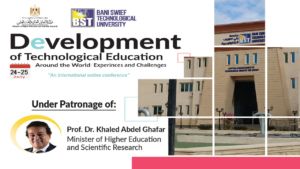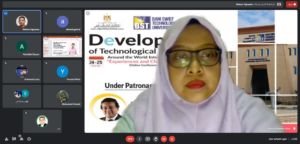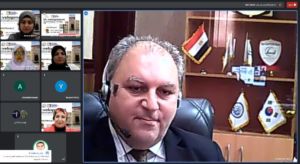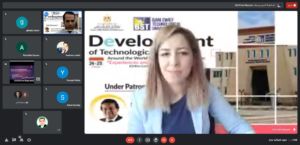Bani Swief Technological University concluded today its first international conference entitled “Development of Technological Education around the World: Experiences and Challenges” which was held virtually (online) under the patronage of Prof. Dr. Khaled Abdul Ghaffar, Minister of Higher Education and Scientific Research, and began on the 24th of July, 2021 with the participation of 37 speakers from 17 countries such as South Korea, India, Indonesia, Romania, Greece, Portugal, and Oman. The conference included experiences and challenges in the field of technological education.
Prof. Dr. Mohamed Shoukr Nada, President of Bani Swief Technological University and President of the Conference, expressed his happiness with the great success of the first international conference of the University, stressing that this success is the best indicator of the University’s ability to deal and communicate with experts from various countries around the world.
The University President thanked the political leadership and His Excellency Prof. Dr. Khaled Abdul Ghaffar, Minister of Higher Education and Scientific Research, for his caring of the path of technological education in Egypt and Bani Swief Technological University. His thanks also extended to Prof. Dr. Mohamed Ayman Ashour, Deputy Minister of Higher Education and Scientific Research for University Affairs, Prof. Dr. Ahmed Hossni Al-Hewy, Advisor to the Minister of Higher Education and Scientific Research for Technical Education and Secretary General of the Education Development Fund, and Mr. Oh Yeon-keum, Country Director of the Korean International Cooperation Agency (KOICA) for their continued cooperation and generous support to the University.
The University President mentioned that the conference at the end of its activities concluded some points and came up with a number of recommendations, the most important of which are:
– The Egyptian-Korean experience, which is carried out through a study of the labor market, was presented, and accordingly the requirements of the labor market were determined to graduate qualified students to compete in the local and international labor markets.
– Linking the school to the University and industry so that technological education starts from technical and industrial schools and connects to the University and then to industry through the possibility of integrating the whole system under a single interconnected entity as in some countries.
– Promoting industry overlap as a third partner in the education system by participating in the preparation of study programs and supporting students in training and after graduation.
– Expansion of international tripartite or quadripartite partnerships to meet the needs of the labor market, as initiated by Bani Swief Technological University in cooperation with major companies and which is being developed.
-Providing mechanisms and technical support for distance learning by the Governments through technological education stakeholders.
-The need to provide support and assistance from the governments through institutions and entities concerned with technological education.
-Expansion of the development of the community’s culture and background of the technological graduate through the media and providing the necessary support.
-Creating virtual laboratories for the theoretical aspect to integrate with the distinctive practical and applicable aspect of technological education, which Bani Swief Technological University has begun by proposing the creation of an integrated educational platform.
-Developing programs and policies to promote women’s participation in education in general and in technological education particularly according to the needs of the labor market.
-A good study of the labor market to enhance the designing of professional technological programs to provide real employment opportunities for graduates.
– The need to provide programs and mechanisms of protection and privacy to protect the working women and youth to enhance their study and work through the internet.
-Expanding youth entrepreneurship programs for small and micro enterprises, especially in a densely populated developing country.
-Publication of a booklet containing the experiences and challenges of the various countries that participated in the conference in the field of technological education.
At the end of the conference, the University President thanked the participating guests and attendees who contributed to the success of the conference, through their active participation in the conference sessions and constructive discussions.
The participants praised the outstanding organization of the conference, expressing their happiness that the conference has addressed important themes that will help promote technological education, and encouraged the possibility of continuing cooperation and participation in similar events in the future.




